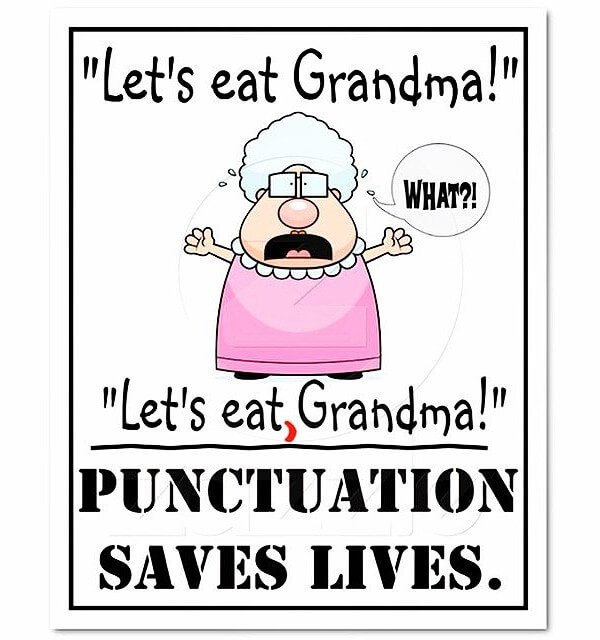Have you ever read a long, complicated sentence, but when you arrived at the end of it you forgot the beginning?
Have you read such sentences over and over again, trying to understand them?
More importantly, have you written sentences like this?
Maybe you thought that long, complicated sentences make a better impression of your English?
Some cultures consider that complicated sentences with complex vocabulary demonstrate the writer’s high level of education and knowledge.
Not in English.

In Anglo-American culture clear, direct communication is highly valued. The reason is that short, clear sentences demonstrate respect for the reader’s time and attention.
Such sentences are also extremely helpful when communicating with non-native speakers.
In fact, in the UK there is even an organisation called the Plain English Campaign that evaluates government and business documents, and recognises those documents that meet its requirements for clear communication. Many government documents proudly display this mark of recognition.
In the US 1000s of university students each year are taught to simplify writing in classes. Americans have even developed a slogan to match this idea – the ‘KISS’ principle.

KISS reminds us to ‘Keep It Simple, Stupid!’.
The writer George Orwell had 6 rules to stop bad writing and to keep language clear and beautiful.
Kissing your Reader
Let’s look at two sentences–one pre-KISS and one ’KISS’ed with clarity:
Pre-KISS:
“Let me just take a minute to say that I am delighted about the opportunity given to me by yourselves to be appointed to the executive team of X Industries and therefore in the next few years I am here with my stated aim to continue the growth of this company in this competitive and rapidly-evolving sector.”
KISSed:
“My appointment to X’s executive team delights me. In the next few years, I aim to continue its growth in this competitive, rapidly-evolving sector.”
As you can see, the first sentence is a long tangle of confusion, with many unnecessary words and lack of punctuation. The message gets buried under all those extra words.
The KISSed sentences distil the message into two clear points.
How To KISS
What are some basic KISS principles to help you simplify your writing?
- Avoid long sentences with multiple subjects and verbs.
- Use as few words as possible to convey a precise meaning.
- Eliminate unnecessary jargon and long words.
- Use punctuation to guide the reader.
Let’s look at each of the above 4 techniques in detail now.
1. Avoid Long Sentences

Long sentences are often caused by compound sentences, i.e. sentences with multiple subjects and verbs.
So how do you avoid compound sentences? Simply divide compound sentences into easy-to-follow, manageable chunks.
Follow the ‘Subject-Verb-Object Rule’, or SVO. According to this rule, the closer the sentence follows this pattern, the easier it is to understand.
Let’s look at some examples.
“One of the lessons learned from my job at Acme Cat Hats Corp during last summer was organization.“
The subject and verb are far apart – see how many words are between the subject (‘one’) and the verb (‘was’)?
This sentence creates confusion because it bombards you with so much information after the subject that it is difficult to link the subject to the verb.
A better sentence construction would be:
“During last summer working at Acme Cat Hats Corp, one lesson I learned was organization.”
Here the subject (‘one lesson’) and the verb (‘was’) are happily close together, minimizing confusion. The additional information sits comfortably at the beginning.

Let’s look at another example.
”Throughout the year, profits have increased, but we have to be vigilant about maintaining our place in the market because our competitors are quite fierce and additionally they have a strong online retail business.”
This is confusing! Here, there are no major problems with the subjects, verbs or objects being too far apart. However, in one sentence there are FOUR subjects and FOUR verbs.
That is a lot of information to take in before you get to ‘rest’ at the full stop.
Why not divide the sentence into 2 or even 3 parts to help the reader remember each important point? We can do so with helpful linking language:
“Throughout the year, profits have increased. However, we have to be vigilant about maintaining our place in the market. In fact, our competitors are quite fierce and additionally they have a strong online retail business.”
This much clearer! With the helpful use of ’however’ and ‘in fact’, this passage clearly highlights the 3 main points: 1) increased profits, 2) need for vigilance and 3) fierce competition.
Kiss-in-Practice: Part 1

Before we continue to the second of the 4 techniques, let’s remember our introductory sentence.
We have a compound sentence divided by ’and’. To improve clarity we divide this long sentence into two separate sentences, to emphasize the 2 separate ideas.
“Let me just take a minute to say that I am delighted about the opportunity given to me by yourselves to be appointed to the executive team of X Industries. and therefore In the next few years I am here with my stated aim to continue the growth of this company in this competitive rapidly-evolving sector.”
But this sentence is still rather confusing, so let’s continue with the next technique.
2. Use as Few Words as Possible to Convey Precise Meaning

We need to cut out all the unnecessary words.
But how do you do that? Let’s look at 2 important ways – possessives and active tenses.
The first technique is to use possessive nouns or pronouns when possible.
Possessive nouns are nouns which show ownership. They are made by adding an ‘s to the noun and putting it before the noun it ‘owns’.
Let’s look at a few examples:
Instead of “the company of my father”
Better “my father’s company”
Instead of “the plant of Y Incorporated”
Better “Y Incorporated’s plant”
There are also possessive adjectives, which include: my, your, his, her, its, our, their. They substitute for a noun which has already been mentioned.

Again, let’s look at a few examples:
Instead of “Kettle and Sons has Kettle and Son’s headquarters in Sudbury.”
Better “Kettle and Sons has its headquarters in Sudbury.”
Instead of “Our CEO is travelling to Paris this week. Our CEO’s schedule is very tight.”
Better “Our CEO is travelling to Paris this week. Her schedule is very tight.”
Possessive nouns and pronouns can really help your writing.
Also, Americans often change passive tenses to active tenses to increase clarity. Here are some examples:
Passive: “ABC Parts was purchased by DP Motors.”
Active: “DP Motors purchased ABC Parts.”
Passive: “Three hundred applications were received by our firm for this vacancy.”
Active: “Our firm received three hundred applications for this vacancy.”
In both cases, the sentence is simplified and also easier to understand.
3. Eliminate Unnecessary Jargon and Long words

We can cut down wordiness and improve comprehension by eliminating repetitive and unnecessary complex language.
This principle is difficult for English learners coming from cultures which prize complex, florid sentences.
Basically, you need to avoid: 1) saying the same things twice and 2) repeating information which is already understood in the situation.
Most importantly – and this concept is challenging for English learners who speak Latin-based languages – you must not use a long word when a short one will do.
Here are some examples:
Too wordy: “My opinion on this matter is that we have only three options.”
Instead of saying “my opinion on this matter”, why not just use a verb which demonstrates you are giving your opinion?
Better: “I think we have three options.”
Too wordy: “The fact of the matter is that Mr. Black developed the feasibility study.”
Is “the fact of the matter” really necessary here? No, it isn’t.
It is understood from the sentence that it is a ‘fact’ that Mr. Black created the feasibility study.
Better: “Mr. Black developed the feasibility study.”

Let’s look at another example.
Use of overly-complex words: “We need to utilise all the resources available. In doing so, we require our staff to do significant research.”
‘Utilise’ and ‘require’ are great words, and can be understood easily by speakers of Latin-based languages, but what about your colleagues in other counties?
Wouldn’t using simpler words with the same meaning be better? Let’s look at the results.
Clearer: “We have to use all the resources available. In doing so, we need our staff to do significant research.”
Now, you have a sentence that is clearer to all non-native speakers.
Kiss-in-Practice: Part 2

Do you remember our introductory sentence? Let’s continue KISSing it:
“
Let me just take a minute to say that[unnecessary, understood from the situation ]I am delighted[use active verb: delights me ]about the opportunity given to me by yourselves[unnecessary, understood from the situation]to be appointed[use another word form: My appointment] totheexecutive teamofX Industries [use possessive noun here: X Industries’ executive team].and thereforeIn the next few years Iam here with[unnecessary]my stated[understood] aim to continue the growthof this company[use possessive pronoun ‘its’] in this competitive rapidly-evolving sector.”
After eliminating all this ’excess baggage’, the sentence becomes a lot clearer:
“My appointment to X’s executive team delights me. In the next few years I aim to continue its growth in this competitive rapidly-evolving sector.”
But there is still more to be done, so let’s move on to the fourth and final technique.
4. Use Punctuation for Clarity

How do you use punctuation for clarity? Your key weapon here is the comma.
In English commas show readers where to ’pause for breath’, and help them read the sentence in meaningful chunks. If you want, you can revise the rules for commas here.
Let’s look at some examples where commas are vital to understanding the sentence.
Confusing: “We need to concentrate on the engineering technology and design sectors.”
Is that the ’engineering technology sector’ and ’design sector’, the ’engineering technology and design sector’, or are engineering, technology AND design all separate sectors?
Only a comma will clarify.
Better: “We need to concentrate on the engineering, technology and design sectors.”
In this case, the comma clarifies that each is separate sector, as the comma after engineering signals a list. Let’s look at another example:
Confusing: “Let’s eat ladies and gentlemen!”
Here, you are asking people to eat ladies and gentlemen! Given the problems that this would create at the office, add a comma for clarity.
Better: “Let’s eat, ladies and gentlemen!”
Kiss-in-Practice: Part 3

Now back to our original example. Adding a comma to the prepositional phrase at the beginning of the sentence, and also to the sequence, allows the reader to pause at the appropriate times to digest meaning.
KISSed to clarity:
“My appointment to X’s executive team delights me. In the next few years[,] I aim to continue its growth in this competitive[,] rapidly-evolving sector.”
Look at that beautifully clear final version!
KISS in Summary
In short, when you write, remember to do the following 4 things:
- Keep your sentences as short as possible, putting subjects, objects and verbs close together.
- Eliminate unnecessary words, using the active tense, possessive nouns and pronouns.
- Avoid jargon and long words.
- Use commas correctly.
Now you are on the road to KISSing long and confusing sentences goodbye!

Why not take out an email you wrote recently and see if you can KISS it to improve the message?
How much unnecessary language can you remove? Your future readers will thank you.
Let us know about your first “KISS” in the comments section below…
